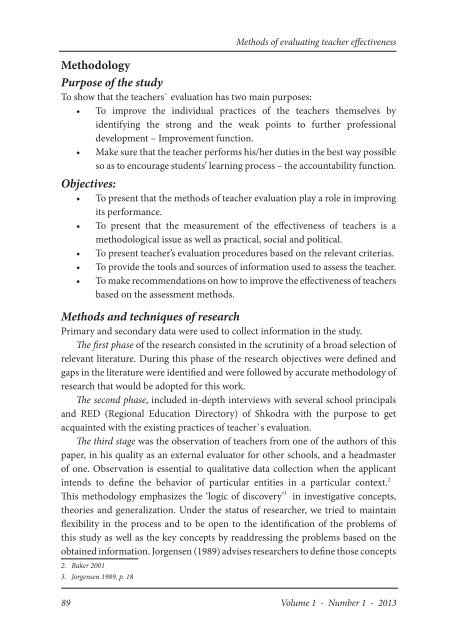Download - qendra per arsim demokratik
Download - qendra per arsim demokratik
Download - qendra per arsim demokratik
You also want an ePaper? Increase the reach of your titles
YUMPU automatically turns print PDFs into web optimized ePapers that Google loves.
Methods of evaluating teacher effectivenessMethodologyPurpose of the studyTo show that the teachers` evaluation has two main purposes:• To improve the individual practices of the teachers themselves byidentifying the strong and the weak points to further professionaldevelopment – Improvement function.• Make sure that the teacher <strong>per</strong>forms his/her duties in the best way possibleso as to encourage students’ learning process – the accountability function.Objectives:• To present that the methods of teacher evaluation play a role in improvingits <strong>per</strong>formance.• To present that the measurement of the effectiveness of teachers is amethodological issue as well as practical, social and political.• To present teacher’s evaluation procedures based on the relevant criterias.• To provide the tools and sources of information used to assess the teacher.• To make recommendations on how to improve the effectiveness of teachersbased on the assessment methods.Methods and techniques of researchPrimary and secondary data were used to collect information in the study.The first phase of the research consisted in the scrutinity of a broad selection ofrelevant literature. During this phase of the research objectives were defined andgaps in the literature were identified and were followed by accurate methodology ofresearch that would be adopted for this work.The second phase, included in-depth interviews with several school principalsand RED (Regional Education Directory) of Shkodra with the purpose to getacquainted with the existing practices of teacher`s evaluation.The third stage was the observation of teachers from one of the authors of thispa<strong>per</strong>, in his quality as an external evaluator for other schools, and a headmasterof one. Observation is essential to qualitative data collection when the applicantintends to define the behavior of particular entities in a particular context. 2This methodology emphasizes the ‘logic of discovery’ 3 in investigative concepts,theories and generalization. Under the status of researcher, we tried to maintainflexibility in the process and to be open to the identification of the problems ofthis study as well as the key concepts by readdressing the problems based on theobtained information. Jorgensen (1989) advises researchers to define those concepts2. Baker 20013. Jorgensen 1989, p. 1889Volume 1 - Number 1 - 2013


